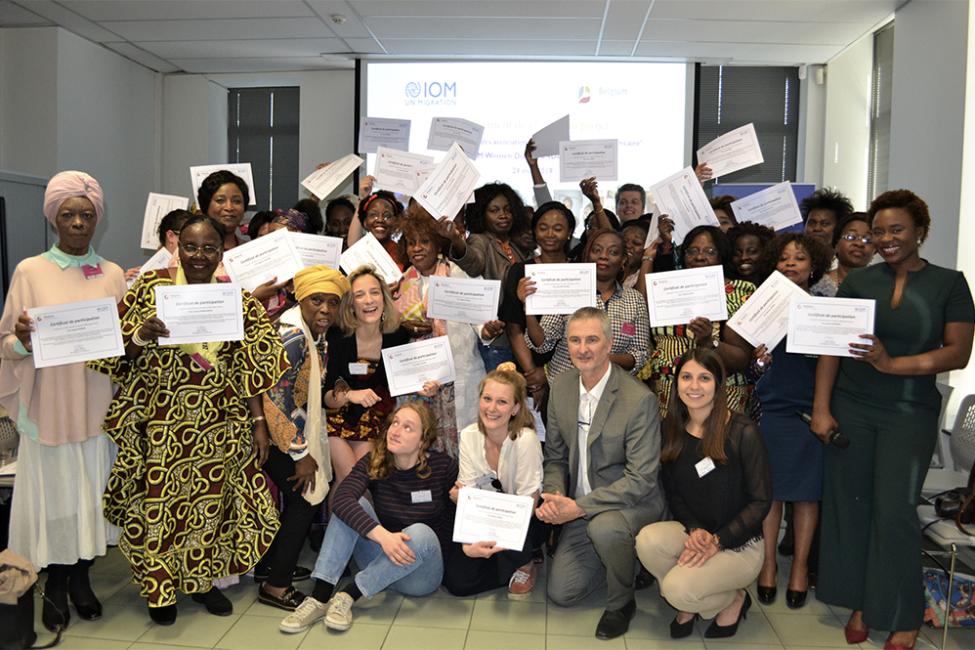-
Who we are
WHO WE AREThe International Organization for Migration (IOM) is part of the United Nations System as the leading inter-governmental organization promoting since 1951 humane and orderly migration for the benefit of all, with 175 member states and a presence in 171 countries.
-
Our Work
Our WorkAs the leading inter-governmental organization promoting since 1951 humane and orderly migration, IOM plays a key role to support the achievement of the 2030 Agenda through different areas of intervention that connect both humanitarian assistance and sustainable development.
What We Do
What We Do
Partnerships
Partnerships
Highlights
Highlights
- Where we work
-
Take Action
Take Action
Work with us
Work with us
Get involved
Get involved
- Data and Research
- 2030 Agenda
Women4Dev Academy: African Diaspora Women’s Groups Empowered in Belgium
Brussels – The number of international migrants grew to 258 million in 2017. Forty-eight per cent of these are women. This global trend has marked the ‘feminization of migration’, which speaks to a higher proportion of women in the migrant workforce, their motivations to migrate, and the role they play in global developments and economies.
Strategies for development at the European Union level increasingly call for new partnerships that go beyond the links with traditional stakeholders. These new partnerships – such as with Diasporas – are key to the promotion of inclusive dialogue and the implementation of the UN Sustainable Development Goals (SDGs).
To respond to these trends, the IOM launched its Women4Dev Academy as a short-term pilot project in December 2017 to empower African diaspora women’s associations in Belgium by strengthening their role and capacities as effective actors in the development of their countries of origin.
The project has allowed 11 African diaspora women’s associations to engage more efficiently in projects through a tailored capacity-building programme. The training was composed of three modules on project management, communication and visibility, and fundraising.
All the trainings took place in MolenGeek, a co-working space in Molenbeek fostering entrepreneurship in a spirit of cultural diversity, gender and sharing competencies.
“Because we have lived in both Africa and in Belgium or in Europe, we are the right people to contribute to the development of Africa, especially being women,” said one of the training participants, Oliva Butoyi, manager of the non-profit association NetEve.
The associations were supported by junior coaches – a soon to be or recent graduate in development cooperation and/or communication studies – to create a unique exchange of experiences between generations.
“Nobody can deny the crucial role that diasporas play in the development of their countries of origin, or the recognized role of women, their families and communities in development,” said Luc Ameye, one of the trainers.
“IOM’s decision to implement such project has its own significance. It has been an enriching experience and encounter between generations, French and English African communities, between nationals from the Great Lakes, but also from Cameroon, Guinea-Conakry, Mali, Tanzania and Zambia,” he continued.
Geertrui Lanneau, IOM’s Senior Regional Labour Mobility and Human Development Specialist in Brussels, praised the accomplishments of the initiative and its implications for the future.
“The project undoubtedly achieved its core aim to empower the participating Diaspora associations,” she said. “It helped to improve their ability to engage with projects benefiting the development of their country of origin, while also increasing their visibility as potential partners for development down the road.”
Watch the video [French] of the event here.
|
The Women4Dev Academy project, implemented by IOM with funding from the Belgian Development Cooperation, is closing today (31/05). A festive cultural and media event was held on 24 May where all 11 associations were given the opportunity to network with potential donors. The event brought together about 130 participants representing various diaspora organizations, cities and municipalities, non-profit organizations, the private sector, and the media. Created in the spirit of the IOM’s “3E” (Enable, Engage and Empower) Strategy for Diaspora, the initiative has supported the SDGs and takes a gender-specific approach to African diaspora. The international community has officially recognised “the positive contribution of migrants for inclusive growth and sustainable development” with the adoption of the 2030 Agenda for Sustainable Development and its SDGs. Have a look at the training modules video here. Click here to find out more details on the Women4Dev Academy initiative. |
For further information, please contact Géraldine d’Hoop at IOM Belgium and Luxembourg, Tel: +32 2 287 74 12, Email: gdhoop@iom.int
